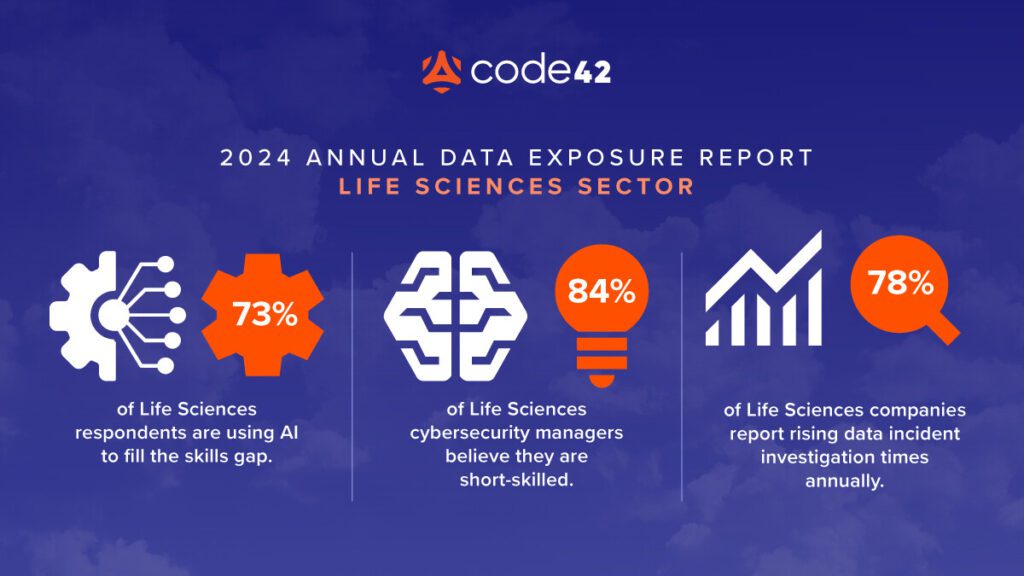Code42 Software, Inc., the leader in data loss and insider threat protection, today released its 2024 Annual Data Exposure Report (DER): Life Sciences Sector. The report highlights a significant trend: 73% of Life Sciences companies are turning to artificial intelligence (AI) to address the cybersecurity skills gap, surpassing adoption rates in other industries.
Underresourced security teams are facing increasing insider-driven data loss events, which are exacerbated by emerging technologies like AI and Generative AI (GenAI). Leaked trade secrets or critical intellectual property (IP) – research data, customer lists, pricing decks, formulary plans, clinical trial data, and source code – can derail Life Sciences organizations. Data is the lifeblood of cutting-edge companies in this sector, and any leak or loss can result in lost opportunities, reputational damage, and even potential HIPAA violations.
“Life Sciences cybersecurity teams are walking a tightrope with AI,” said Joe Payne, President and CEO of Code42. “AI is a powerful ally in combating skill shortages and rising insider threats, while also paving new pathways for innovation. However, as quickly as teams are adopting this new technology, they must be just as quick to set guardrails for protecting IP. By adopting tools and programs to secure the usage of AI tools, teams in the Life Sciences can take advantage of cutting-edge technology while ensuring their data isn’t leaked through tools like ChatGPT.”
Key findings from the report include:
- 78% of companies report an increase in time spent investigating data incidents year over year.
- 83% of cybersecurity managers are looking to AI, and 92% to GenAI, specifically, to help them automate detection and response so that they can focus on higher-level strategic tasks.
- 86% of cybersecurity leaders have admitted that the usage of AI tools does put their company at risk of data exfiltration.
- 50% of data loss incidents are malicious, with risk severity evenly split between low, medium, and high.
- Daily data security training has increased from 11% in 2021 to 27% in 2024.
- 97% of Life Sciences organizations believe their data security training programs need improvement, with 48% calling for a complete overhaul.
The results reveal that the Life Sciences sector is at the forefront of artificial intelligence utilization, with AI tools presenting new opportunities for cybersecurity teams to enable automated detection and response, as well as freeing up the resources to concentrate on strategic tasks. To successfully harness the power of AI without inviting additional risks, organizations must implement robust solutions that detect, prioritize, and respond to incidents while minimizing overall insider-driven risk.
For the full report and methodology visit https://www.code42.com/resources/reports/2024-data-exposure-life-sciences.
Methodology
Code42 commissioned independent market research agency Vanson Bourne to conduct the Data Exposure Research. The 2024 study surveyed 700 respondents (300 cybersecurity practitioners, 200 cybersecurity managers and 200 cybersecurity leaders) from companies headquartered in the US from December 2023 to January 2024. These companies had 500 or more employees and were from a range of public and private sectors, including automotive and aerospace/manufacturing, business and professional services, energy, oil/gas and utilities, technology, and pharmaceutical and life sciences/biotechnology, among other sectors. Of those participants, 144 were part of the Life Sciences/biotechnology sector.

